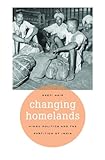Changing homelands : Hindu politics and the partition of India / Neeti Nair.
Material type: TextPublication details: Cambridge, Mass. : Harvard University Press, 2011.Description: 1 online resource (343 pages) : mapsContent type:
TextPublication details: Cambridge, Mass. : Harvard University Press, 2011.Description: 1 online resource (343 pages) : mapsContent type: - text
- computer
- online resource
- 9780674061156
- 0674061152
- Punjab (India) -- Politics and government -- 20th century
- Hindus -- India -- Punjab -- Politics and government -- 20th century
- India -- History -- Partition, 1947 -- Influence
- Identity (Psychology) -- India -- Punjab -- History -- 20th century
- Nationalism -- India -- Punjab -- History -- 20th century
- Religion and politics -- India -- Punjab -- History -- 20th century
- Religious minorities -- India -- Punjab -- History -- 20th century
- Punjab (India) -- Ethnic relations -- History -- 20th century
- Muslims -- India -- Punjab -- History -- 20th century
- Sikhs -- India -- Punjab -- History -- 20th century
- Identité (Psychologie) -- Inde -- Pendjab -- Histoire -- 20e siècle
- Nationalisme -- Inde -- Pendjab -- Histoire -- 20e siècle
- Religion et politique -- Inde -- Pendjab -- Histoire -- 20e siècle
- Minorités religieuses -- Inde -- Pendjab -- Histoire -- 20e siècle
- Pendjab (Inde) -- Relations interethniques -- Histoire -- 20e siècle
- Musulmans -- Inde -- Pendjab -- Histoire -- 20e siècle
- Sikhs -- Inde -- Pendjab -- Histoire -- 20e siècle
- HISTORY -- Asia -- India & South Asia
- POLITICAL SCIENCE -- Political Ideologies -- Nationalism & Patriotism
- Ethnic relations
- Hindus -- Politics and government
- Identity (Psychology)
- Influence (Literary, artistic, etc.)
- Muslims
- Nationalism
- Politics and government
- Religion and politics
- Religious minorities
- Sikhs
- India
- India -- Punjab
- Krieg
- Teilung
- Hindu
- Minderheit
- Vorgeschichte
- Indien
- Pakistan
- Punjab (Indien)
- Religion och politik -- Indien
- Etniska relationer -- Indien
- Partition of India (India : 1947)
- 1900-1999
- 954.04/2 22
- DS485.P87 N344 2011eb
| Item type | Home library | Collection | Call number | Materials specified | Status | Date due | Barcode | |
|---|---|---|---|---|---|---|---|---|
 Electronic-Books
Electronic-Books
|
OPJGU Sonepat- Campus | E-Books EBSCO | Available |
Includes bibliographical references and index.
Loyalty and anti-colonial nationalism -- Negotiating a minority status -- Religion and non-violence in Punjabi politics -- Toward an all-India settlement -- Partition violence and the question of responsibility -- Memory and the search for meaning in post-partition Delhi -- Glossary.
Print version record.
Changing Homelands offers a startling new perspective on what was and was not politically possible in late colonial India. In this highly readable account of the partition in the Punjab, Neeti Nair rejects the idea that essential differences between the Hindu and Muslim communities made political settlement impossible. Far from being an inevitable solution, the idea of partition was a very late, stunning surprise to the majority of Hindus in the region. In tracing the political and social history of the Punjab from the early years of the twentieth century, Nair overturns the entrenched view that Muslims were responsible for the partition of India. Some powerful Punjabi Hindus also preferred partition and contributed to its adoption. Almost no one, however, foresaw the deaths and devastation that would follow in its wake. Though much has been written on the politics of the Muslim and Sikh communities in the Punjab, Nair is the first historian to focus on the Hindu minority, both before and long after the divide of 1947. She engages with politics in post-Partition India by drawing from oral histories that reveal the complex relationship between memory and history--a relationship that continues to inform politics between India and Pakistan.
Neeti Nair's account of the partition in the Punjab rejects the idea that essential differences between the Hindu and Muslim communities made political settlement impossible. Far from being an inevitable solution, partition--though advocated by some powerful Hindus--was a stunning surprise to the majority of Hindus in the region.
In English.
eBooks on EBSCOhost EBSCO eBook Subscription Academic Collection - Worldwide
There are no comments on this title.

